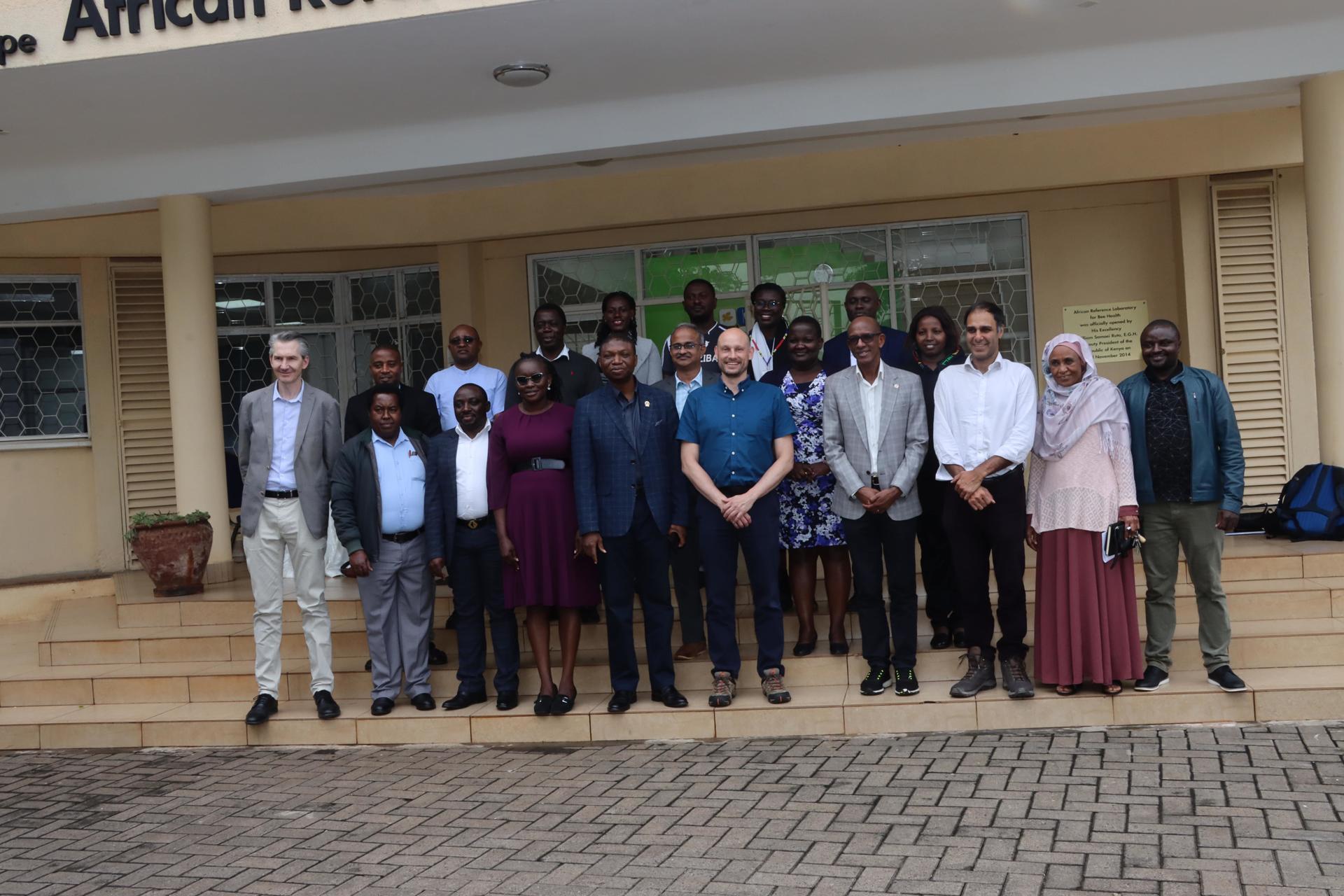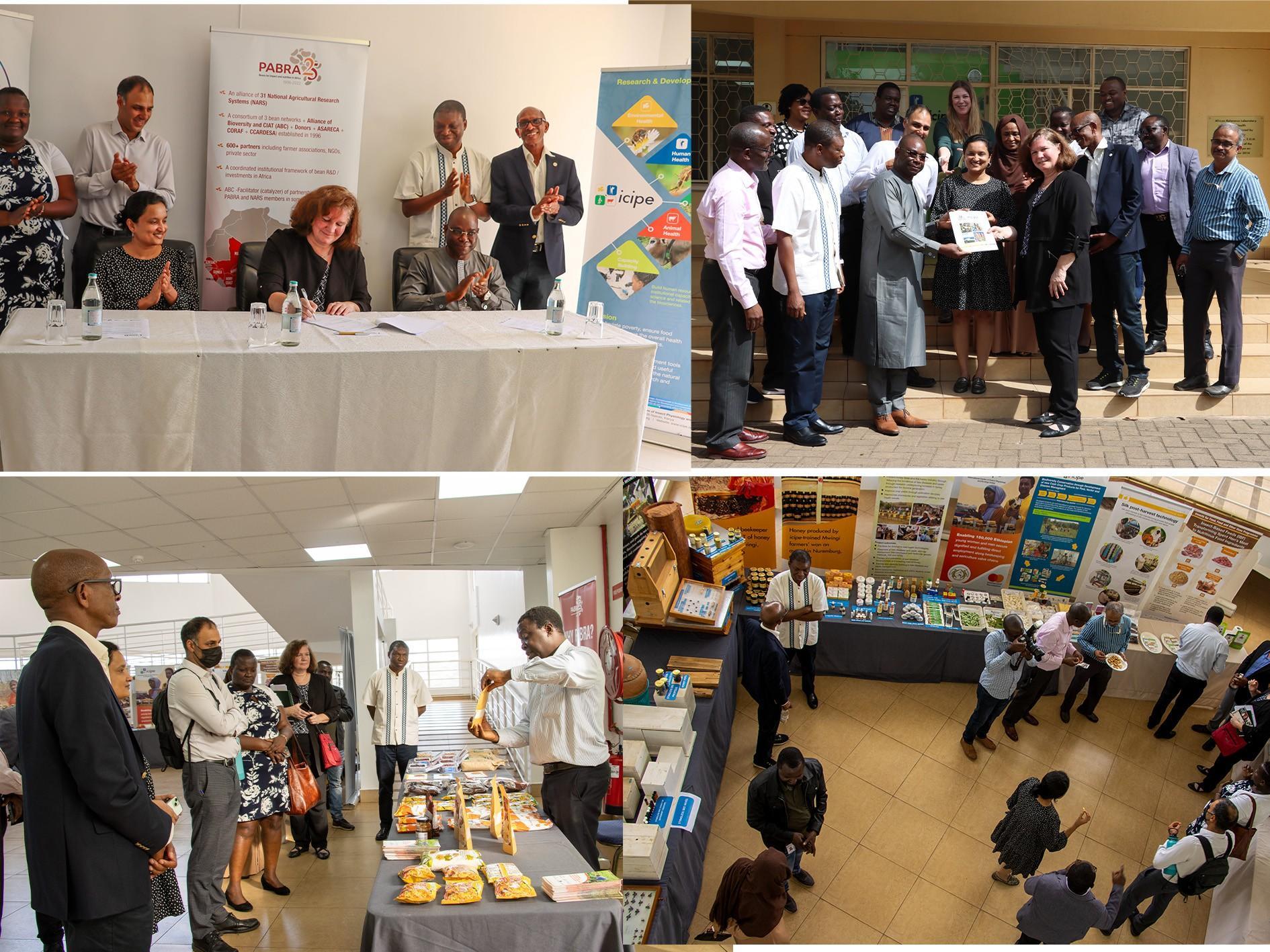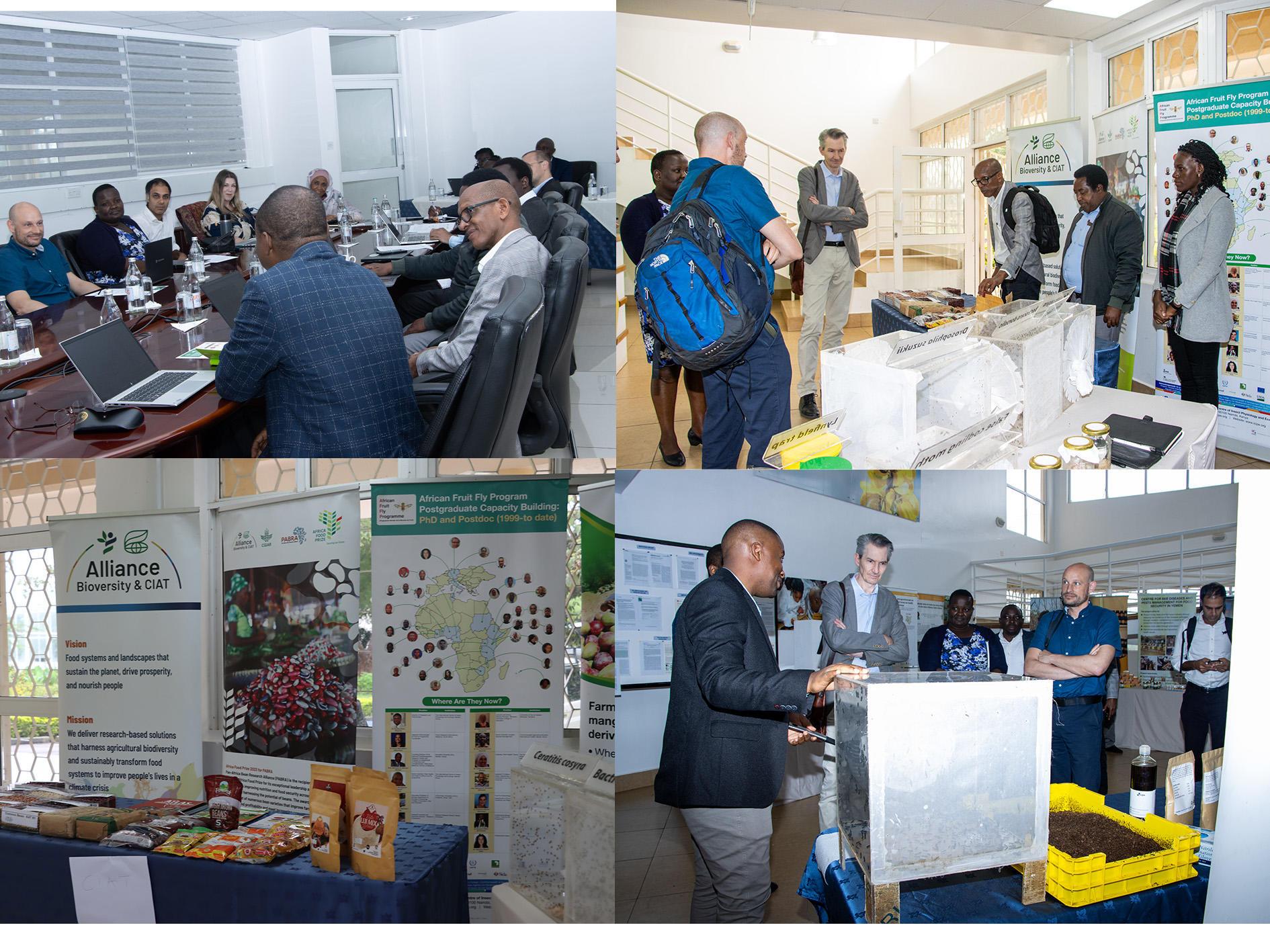Blog Transforming Lives and Landscapes in Sub-Saharan Africa through PABRA’s Extensive Network

Pan-Africa Bean Research Alliance (PABRA) and the International Center of Insect Physiology and Ecology (icipe) collaborated to implement the BRAINS initiative, funded by the Government of Canada. BRAINS aims to establish new trade partnerships and markets, as well as an investment platform for beans, fruits, edible insects, and pollination services. The innovation is designed to be climate-smart and benefit women and young people.
By: Esther Nzuki, Edith Mutui, Jean Claude Rubyogo
According to the 2023 Outcome Impact Case Report, the Pan-Africa Bean Research Alliance (PABRA) has facilitated the release of over 650 new bean varieties, in 31 African countries, which have reached more than 42.7 million farmers (58% of whom are women), thus significantly improving nutrition, health, food security and economic status. More than 275,000 school-age children (51% girls) in Tanzania, Rwanda, Uganda, Burundi, and Zimbabwe now regularly enjoy high-iron beans in school feeding programs. In addition, more than 5 million households in 10 African countries have seen a 30% increase in household income.
PABRA has responded to the increasing demand for improved nutrition. For over 26 years, it have gained worldwide recognition for its work in Africa, attracting partnerships with governments, research institutions, and public and private sector partners, helping to develop and disseminate nutrient-rich bean varieties.
“A few of the key lessons PABRA and its NARS members have gained over time is to focus on the whole bean value chain to deliver multiple impacts. Implementing demand-led breeding in the bean corridors has generated farmer- and consumer-demanded varieties. We highly appreciate the complementary funding from multi-lateral investors, including donors such as GAC, ACIAR, BMGF, SDC and USAID, PABRA members’ governments, NGOs, and the private sector.” - Jean Claude Rubyogo, Bean Programme Leader & Director, PABRA, Alliance of Bioversity International and CIAT

Jean Claude Rubyogo
Lead, Global Bean Program and Director, Pan Africa Bean Research Alliance (PABRA)PABRA and icipe hosted Dr. Nikita Ericksen Hamel - Deputy Director, Global Affairs Canada (GAC) for Agriculture and Food Security of the Canadian Government - at the ICIPE office, accompanied by Mr. Hanif Pabani and Hellen Oriaro from the Canadian High Commission in Nairobi. The visit by GAC aimed at strengthening the partnership between GAC, PABRA and icipe in implementing the BRAINS initiative in 15 sub-Saharan African countries, directly benefitting 5 million smallholder farmers, 2.5 million consumers including school-age children, and a range of value chain actors.

Juan Lucas Restrepo
Director General of the Alliance of Bioversity International and CIAT, Trustee for Bioversity International UK/USA“Integrating bean, fruit, and edible insect economies presents a great opportunity for sustainable food systems in Africa. They are effective vehicles to accelerate inclusive climate adaptation outcomes at scale, whilst also improving food and nutrition security, and the livelihoods of millions of producers.” - Juan Lucas Restrepo, Director General, Alliance of Bioversity International and CIAT
Through BRAINS, The Alliance and icipe will collaborate with national agricultural research institutes, through a South-South participatory development approach to integrate bean, fruit and insect production for food and feed farming.
“The BRAINS initiative is an example of the power of partnerships. It will harness the extensive experience, innovations, networks, efficiencies of scale, and the broad geographical reach of the Alliance and icipe, into a system-based approach. This strategy will promote value chains and markets that are gender-transformative and resilient to climate change.” - Abdou Tenkouano, Director General, icipe

Launch and signing of the agreement of the CAD $20 million grant for the BRAINS initiative on 30 January 2024 at the Bee Health Board room-icipe Campus. Photo credit: Alliance Bioversity International and CIAT / Esther Nzuki
The key local partner is the Kenya Agriculture and Livestock Organization (KALRO). The bean varieties released by KALRO its partnership with PABRA in 2017 include four consumer-demanded varieties (Angaza, Nyota, Faida, and Metameta). These high-yielding varieties are micronutrient-rich (high in iron and zinc) and climate-smart (early maturing within 65-80 days), as well as more resilient to drought, diseases and pests.
Mr, David Karanja - KALRO’s National Coordinator for Grains and Legumes - shed light on factors that have contributed to the release of PABRA bean varieties including Nyota and Angaza:
“The government as a customer wants bean varieties that contribute to farmers’ incomes, increase national food security, and have a market. In return, the government offers extension services, more partnerships, and improved access or purchase of inputs such as certified seeds. On the other hand, we have off-takers, processors, and consumers who want bean varieties that are easily digestible, tasty, fast cooking, and a 99.5% purity level.”
In his presentation, Dr Sunday Ekesi - Head, Capacity Building and Integrated Sciences, icipe - stated that icipe uses the 4-H Themes as an impact pathway. These are Environmental Health, Human Health, Plant Health, and Animal Health, meeting at the nexus of 'One Health'. Ekesi reported that this work has reduced poverty, improved human and environmental health, and increased crop and livestock production, which they have integrated into BRAINS.
“Edible Insects are useful for circular economy and one health, and beans will complement smallholder farmers’ resilience by enhancing nitrogen fixation and soil enrichment, while fruit trees and bee-friendly trees are perennial and drought-tolerant, thus protecting landscapes, restoring soil fertility, and increasing carbon sequestration. Insects form part of the traditional diet of at least 2 billion people and are an excellent protein source, though they remain highly underutilized.”

Images of Dr. Nikita Ericksen's visit. Photo credit: Alliance Bioversity International and CIAT/Joseline Kiogora
The remarkable impact of climate-resilient, farmer- and consumer-preferred and high-iron bean varieties on food security across Sub-Saharan Africa highlights the role of innovative agricultural solutions in addressing the complex challenges of climate change, food security, and nutrition while creating business opportunities for smallholder women farmers and traders. The collaborative efforts of PABRA and its partners have empowered millions of households through increased incomes and provided school children with improved nutrition.
“PABRA's impact on smallholders and local businesses demonstrates how long-term and focused dynamic research is essential to transform entire value chains. Ranging from genetics to market/value chains, inclusive business practices that foster supportive investments, and catalyzing complementary investments, PABRA provides learning for other commodities. BRAINS - which brings together PABRA and icipe - is a great opportunity to use PABRA's extensive networks to increase biodiversity, improve farmers' livelihoods, and increase resilience to climate change. Dr. Nikita Ericksen-Hamel - Deputy Director, GAC
Building Equitable Climate-Resilient African Bean & INsect Sectors (BRAINS) is an initiative of the PABRA-ICIPE partnership funded by the Government of Canada. The main aim is to develop low-carbon, climate-resilient systems, that are favorable to women and the youth, using bean, and fruit trees, and beneficial insect farming and business enterprises.



